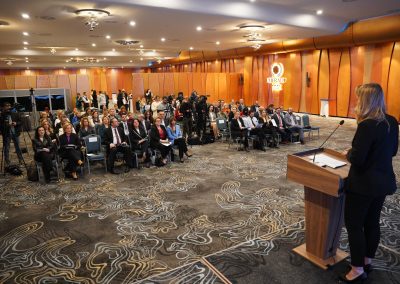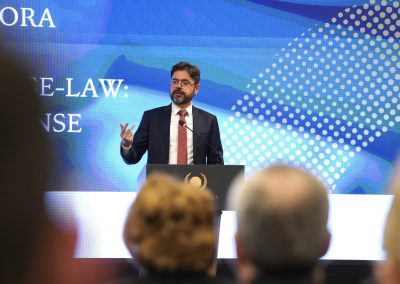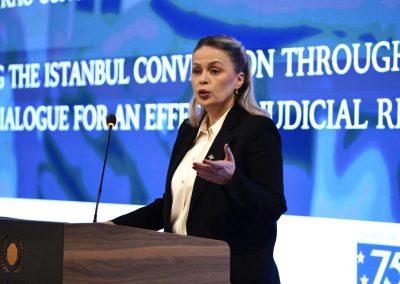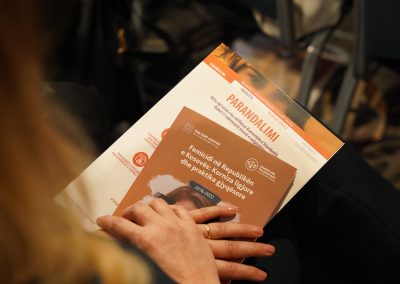Over 100 representatives of key judicial institutions, including courts, prosecutor’s offices, and law enforcement agencies, as well as representatives of relevant government authorities, international organisations, embassies, and civil society, gathered today in Pristina for the conference “Implementing the Istanbul Convention through Case-Law: Judicial Dialogue for an Effective Judicial Response”.
Organised by the Constitutional Court of the Republic of Kosovo, in cooperation with the Council of Europe and the AIRE Centre (supported by the Government of the United Kingdom), this event will focus on the discussion about practical solutions that would lead to greater implementation of the Istanbul Convention, enhancement of the judicial response to violence against women and domestic violence, and the strengthening of inter-institutional cooperation to ensure effective and coordinated measures for the prevention, investigation, and prosecution of these crimes.
At the opening of the conference, Gresa Caka-Nimani, President of the Constitutional Court of the Republic of Kosovo, said “one of the main characteristics of the Istanbul Convention is the call for comprehensive and coordinated action and response to all forms of violence against women”, adding that today’s conference will “serves as a platform for reflection on the positive obligations of the Republic of Kosovo, in the context of gender equality and the effective prevention and combating of gender-based violence”.
“The open discussion is an opportunity to identify the achievements, challenges, and solutions. It is also a moment of reflection on the sad stories of Kosovar women, who have continuously been subjected to domestic violence, including the failure of state authorities to protect their right to life. The Constitution of the Republic of Kosovo embodies the highest values and standards in the context of fundamental rights and freedoms, including gender equality. Their effective implementation in practice is only possible through unwavering commitment to cooperation and dialogue and through the continuous advancement of mechanisms that enable the full implementation of the obligations stemming from the European Convention on Human Rights and the Istanbul Convention”, said President Caka-Nimani.
Albulena Haxhiu, Minister of Justice and National Coordinator for Protection Against Domestic Violence, Violence against Women and Gender Based Violence of Kosovo, noted that: “For the first time, the institutions of the Republic of Kosovo, have taken over their responsibilities pertaining to addressing domestic violence and gender-based violence. In this case, I consider that to be successful in our efforts, none of the chains should fail, otherwise we will be faced again with murder and violation of the rights of the victims.”
In what followed, she mentioned that: “We have to do our best so every victim or every girl or woman that could potentially be violated in the future, knows that she has full institutional, as well as social support and not the other way around, since this does also help in reporting violence but in silencing it, as well as to prevent such cases, always in the instance the decisions against the violators are in compliance with the applicable legislation and meritorious as such”. “From this Conference also, I make the call that social norms, that oftentimes justify violence, should be fought against and that every respective institution, should undertake with high responsibility and professionalism their obligations, and in case of failure, measures should be taken, that I am confident will in the future discipline every official, irrespective of the institution”, said Minister Haxhiu.
Biljana Braithwaite, Director of the AIRE Centre’s Western Balkans Programme, highlighted that while countries in the region have adopted laws and international standards against violence, their ineffective implementation still leaves women vulnerable.
“Our research has shown grave violations of women’s rights, evident in a large number of cases of gender-based violence and femicides in the region. Women are most often the least safe within their own homes, and the abusers are, in most cases, those closest to them i.e., their family members or their partners. In addition, every new social, economic, or health crisis, leads to a new eruption of violence”, said Braithwaite.
Between 2018 and 2022, twenty femicides and four attempted femicides were committed, and in almost all cases, the victims were killed by their husbands, it was stated in the report “Femicide in the Republic of Kosovo: Legal framework and judicial practice (2018–2022)“, presented at today’s conference.
Tankut Soykan, Deputy Head of the Council of Europe’s Office in Pristina, highlighted that in November 2022, the Council of Europe published a report on the “Assessment of alignment of domestic laws, policies and other measures with the standards of the Istanbul Convention” which followed the GREVIO methodology. The assessment report provides for each article of the Istanbul Convention findings and presents recommendations and concrete steps to further align with the Istanbul Convention. The assessment report recognises progress that has been made, but also identifies areas where more work is needed and where action should be taken, urgently in some cases.
“The Council of Europe, as Europe’s leading international human rights organisation, is working closely with local authorities including the Constitutional Court to enhance justice responses to violence against women in line with the standards of the Istanbul Convention and the case-law of the European Court of Human Rights”, said Soykan.
The event featured keynote addresses by international experts, Dunja Mijatović, the Council of Europe’s Human Rights Commissioner, and Robert Spano, former President of the European Court of Human Rights and President of the Board of Patrons of the Gender Champions in the Judiciary Network, that delved into effective strategies for utilising international instruments to address violence against women and femicide on the national level.






